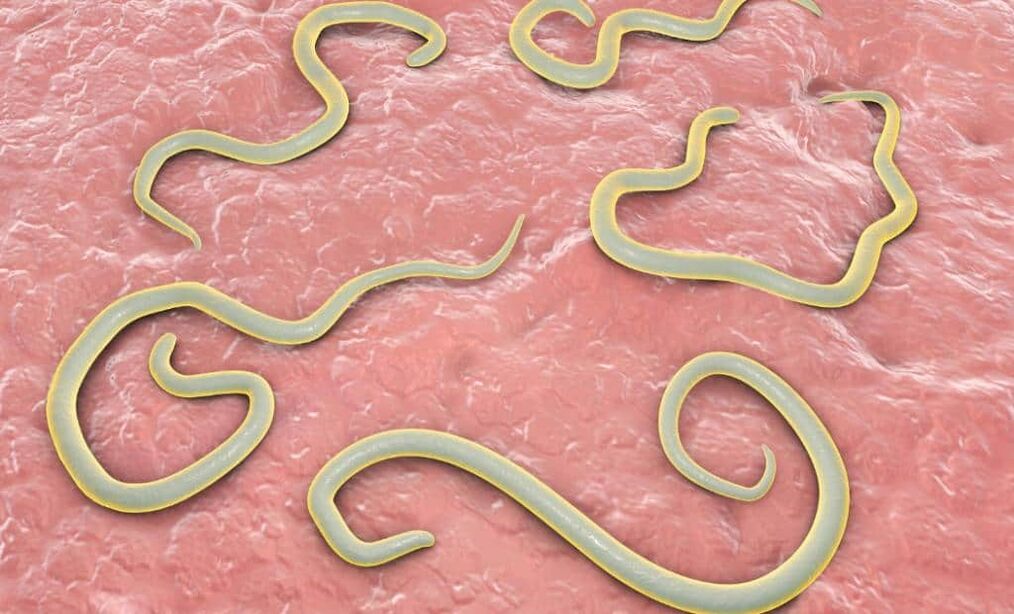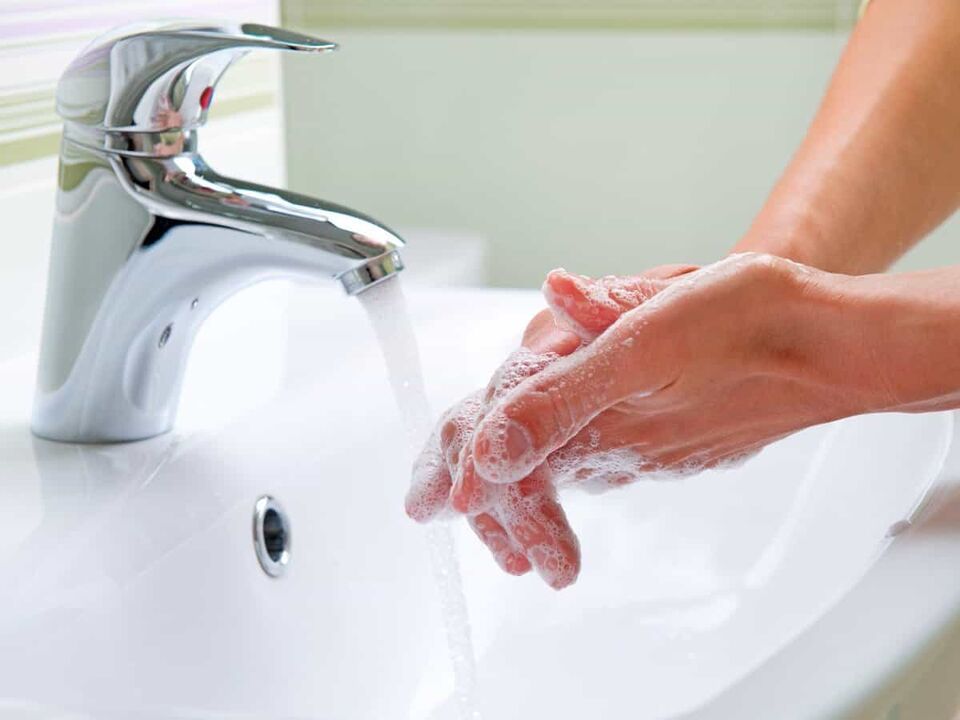Prevention of wormsincluding compliance with strict hygiene rules. Many of us do not even realize that we are infected with various parasites. Fatigue, lethargy, headaches and poor digestion are often attributed to overwork or the quality of food. And few think that these symptoms could be signs of a parasite infestation.
The worst is the latent worms, which slowly destroy our health. The risk group includes children, whose bodies are often not able to defend themselves against parasites. Therefore, it is important to prevent worms in a natural way, with the help of immunity.
Worms and harm to the body
Infection with worms in humans can be caused by more than 400 species of parasitic worms. Infection usually occurs through contaminated food and water, rarely the worms enter the body through the skin.

Depending on the route of infection, parasites are divided into 3 groups:
- helminths- through food (echinococcus, beef and pig tapeworms);
- geohelminths- hands contaminated with faeces, household objects, sometimes water (e. g. whipworms, hookworms, roundworms);
- contact with worms- When in personal contact with sick people, rarely self-infection (pinworms, dwarf tapeworms).
According to the structure of the body, parasites are divided into the following types:
- round (nematode);
- tape (code);
- flukes (with strong suckers and flattened bodies).
At-risk groups include children attending preschools, agricultural workers, immunocompromised patients, the elderly, and the elderly. Pets may also be at risk of infection.
In adults, trichiasis is often silent (hidden), has a long course, and manifests with various clinical signs disguised as another pathology. Children are characterized by an acute episode with vivid symptoms, which is associated with peculiarities of the immune system.
Worms use the human body as a source of food, habitat and reproduction. Instead, releasing the products of their vital activity, the worms cause systemic toxic damage to human organs and systems.
For example, hookworm larvae secrete anticoagulants to maintain blood flow. It is estimated that A. duodenale alone causes 0. 2 ml of blood loss per day. If 5 ml of blood is lost, the presence of 25 helminth fragments in the body is enough. But usually there's more to it than that. As a result, the patient becomes severely anemic.
According to many studies, the penetration of helminths contributes to the more frequent development of somatic diseases, exacerbation of chronic pathologies, has a negative effect on the host organism, including the immune system. its immune system.
Characteristic of most helminth diseases is a chronic process associated with the prolonged presence of the pathogen in the body and repeated infections. Heartworm disease in children is often accompanied by many non-specific symptoms: weakness, fatigue, irritability, sleep disturbances, indigestion, growth retardation and weight gain, decreased immunity.
Diseases caused by helminths reduce the ability to work and the quality of life deteriorates.
The role of antihelminthic immunity
The immune system is protected for our health. It protects the body from the invasion of viruses, bacteria and parasites. Unfortunately, the immunity to the latter is a little worse. This is especially true for children. The child's defenses are not fully developed, and the penetration of helminths further reduces the body's resistance to infections. Therefore, the prevention of worms for children is very important.

Immunity against parasites is similar to immunity against bacteria. Both cellular and humoral binding are involved in protection from helminths. The first barrier to intruders is the skin and mucous membranes. Normally, worms enter the body through the digestive tract. The mucous membranes of the stomach and intestines contain immune cells that trigger a series of responses to eliminate the parasite and remove the parasite from the body.
The problem is that helminths have their own defense mechanism, which often allows them to easily get past the first barrier.
Immunity against helminths is divided into primary and secondary. Since the main man is born, he is a genetically determined protective factor. Secondary is formed during life after infection and produces specific antibodies against a particular parasite.
Recently discovered TSLP (Thymus Stromal Lymphopoietin) has aroused great interest of scientists. Due to its unique properties, cytokines play an important role in protecting the body from worms. Depending on the nature of the infection, TSLP can either enhance or suppress the defense responses regulated by two types of T lymphocytes.
The ability to infect is largely dependent on innate immunity and the health of the immune system in general, the effectiveness of which is always individual and depends on the type of worm.
The good functioning of the immune system depends on our nutrition, if the body lacks the vitamins and minerals it needs to build immune cells, then the response to infections will be weak and the fight againstwill end in failure.
Immunity requires biologically active substances that come to us with food. In case of chronic stress or illness, supporting the immune system with vitamins and trace elements is imperative, as the body uses all the nutrients to strengthen the nervous system, as well asherbs. And only in severe cases, use drugs to treat.
How does immunity against worms work?
Primary immunity against helminths may work in a number of ways:
- Parasites adapt to the environment inside the host's body, grow well, develop, multiply. The immune response is minimal. In such cases, helminth infections are long-lasting, sometimes difficult. An example is a dwarf tapeworm infestation.
- A moderate immune response occurs to helminthic invasion. This limits the worm's ability to reproduce. For example, roundworms.
- The defense response is well expressed, preventing the full development of the parasite. Worms have not yet reached sexual maturity but can be harmful to health. The disease is short-lived or has a latent (latent) episode.
- Effective primary immunity prevents the introduction of parasites at the skin and mucous membrane stage. Thanks to this, the worms do not penetrate the internal organs and do not cause harm to health.
Secondary immunity helps the body respond more quickly and effectively to repeated infestations of helminths. This prevents the growth of worms at the first stage of infection and reduces the toxic effect. The protective response is based on the presence in the blood of antibodies (immunoglobulins) to this helminth.
The main links of the immune system against the invasion of parasites:
- reaction of the tissues of internal organs, which leads to isolation (cyst formation) and destruction of worms;
- production of type A and E immunoglobulins;
- changes in hormonal activity, especially on the part of estrogen, found in both the female and male bodies;
- genetic factors (primary immunity against parasites).
One sign of infection is a high level of eosinophils in the blood, which indicates an allergic reaction. The second important point is that immunoglobulin E levels increase sharply, as long as food intolerance is present.
Important precautionary rules
Immunity copes with the invasion of parasites in different ways, which are not always effective enough. Our mission is to help the body prevent the threat of alien invasion. Precautions must be observed at all times and without exception.
Parents should teach their children from an early age the rules of personal hygiene to reduce the risk of infection.
The preventive measures are simple and accessible to everyone, and at the same time allow you to completely (or almost completely) eliminate the risk of penetration of helminths. However, doctors recommend that at-risk groups take additional prophylaxis with drugs, even when all necessary measures are taken. The drug is also prescribed by the doctor if an infection is suspected or worms are detected during the diagnosis.
Rules for the prevention of helminthiasis:
- Purchase meat and fish products at designated locations. The seller must have a certificate of quality and a certificate of health.
- Cook food just enough. Follow the rules of salting, canning, and pickling.
- Drink boiled water from the tap or filtered water.
- Wash vegetables and fruits under running water before use. You can first wash the greens in soapy water, then rinse with clean water. Strawberries are soaked in a 1% soda solution. After the berries are washed thoroughly with running water. Vegetables that are heavily contaminated with feces should first be soaked in a weak iodine solution (no more than 0. 3%).
- Observe the rules of personal hygiene. Wash your hands with soap and water after using the bathroom, going outdoors, working in your garden, and after every contact with animals, including pets.
- Clean the area regularly with disinfectants, especially bathrooms and kitchens.
- Deworm your pets according to your veterinarian's schedule (usually 1-2 times/year).
- In case of helminth infection, pay special attention to hand and nail hygiene, wash children's hands in the evening and in the morning, each time change underwear and bed linen that has been ironed with an iron. This prevents repeated self-infections.
- It is important to live a healthy lifestyle to strengthen and maintain your immune system. Proper nutrition, regular physical activity, the right response to stress and rejection of bad habits will reduce the risk of parasitic infections.
- Prophylaxis of chemicals 1-2 times / year according to the regimen prescribed by the doctor.

Dewormers come in pill form.This is a chemical prophylactic method to destroy parasites that may have entered the body, but did not have time to cause a reaction from internal organs.
They have anti-helminthic effectsPumpkin seeds.Before eating, the seeds can be chopped and mixed with a little honey. The daily dose for adults is 300 grams, for children, depending on age. Up to 4 years old - 80 grams, up to 7 years old - 100 grams, up to 10 years old - 150 grams, up to 15 years old - 200 grams. After 3 hours, a laxative is taken.
Prevention of helminthiasis includes strengthening the immune system, observing the rules of personal hygiene and culinary processing of products. By following simple rules, we can protect ourselves from worm infections. Annual chemoprophylaxis helps our immune system to cope with foreign attack.
Talk to your doctor before taking an anthelmintic. The specialist will choose the right medicine for you and give you a treatment plan. Uncontrolled reception can be not only unhelpful, but also harmful to your health. Don't forget this.
An excellent alternative to drugs are herbs from worms.





























